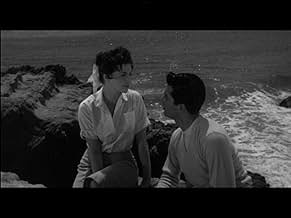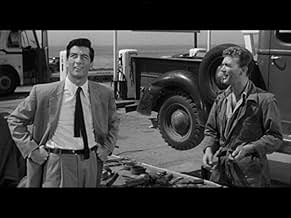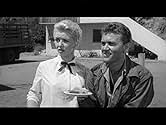Adicionar um enredo no seu idiomaA mental patient with a violent past is released from the institution, against the advice of his doctors, and sent back to his old neighborhood. Realizing that he can't handle the pressures ... Ler tudoA mental patient with a violent past is released from the institution, against the advice of his doctors, and sent back to his old neighborhood. Realizing that he can't handle the pressures of big city life, and not wanting to commit the kinds of crimes that got him put away in t... Ler tudoA mental patient with a violent past is released from the institution, against the advice of his doctors, and sent back to his old neighborhood. Realizing that he can't handle the pressures of big city life, and not wanting to commit the kinds of crimes that got him put away in the first place, he hops a bus heading out of the city and winds up in a small coastal town... Ler tudo
- Vernon
- (as Eddy C. Waller)
- Male interviewer
- (as Richard Cutting)
- Bus Driver
- (não creditado)
- Boy
- (não creditado)
- Mailman
- (não creditado)
- Waitress
- (não creditado)
- Direção
- Roteiristas
- Elenco e equipe completos
- Produção, bilheteria e muito mais no IMDbPro
Avaliações em destaque
Owing to economic pressures, Danton gains release, against the better judgement of his doctor, from the mental institution where he's been confined - there was a vague, violent incident in his past. But he's unequipped for the outside world. In Los Angeles, he bolts from a job interview when asked to fill in the holes in his resumé and starts to assault a man in the street he bumps into. Trying a geographic cure, he gets aboard a Greyhound, takes a liking to a little coastal town during a rest stop, and decides to stay.
He books a room in an off-season motel where he raises suspicions in the owner (Willis Bouchey) but falls for his daughter (Colleen Miller). The salt air, a new job in the aerospace industry and the prospect of romance do wonders until Bouchey, having ferreted out the dark secret, locks Danton out of his room and bids him hit the road. Whereupon Danton kills him, making it look like a robbery, and carries on his courtship with the bereaved Miller as if nothing had happened. But when evidence that he played a part in the slaying starts surfacing (even though one character observes that `A lot of people spill nail polish on money'), his false façade of stability starts to topple....
The man behind The Night Runner, Abner Biberman, was a minor actor (often playing Asian roles!) from the mid-1930s until he turned to directing in the mid-1950s. Frustratingly, he shows glimmers of talent, even sensitivity, but ultimately chooses a facile, melodramatic path (though Universal International Pictures may have forced his hand). The script is prescient about the too-early release from institutions of psychiatric patients not yet ready to cope with the stresses and responsibilities of daily living, an enlightened view underscored by Danton's largely restrained performance. But then the inexorable machinery of the suspense plot demands that he erupt as a psycho-killer. Still, the movie's end unmasks Danton as not quite a monster but rather a misfit with some sad insight into why the `normal' life he craves can never be his.
Abner Biberman's last movie as director -- he continued to work on episodic television until the early 1970s -- is a well-meaning study with a plea for better psychiatric funding. It's directed in a dry fashion, and Danton is pretty good in the lead role, aided by George Robinson's subtle lighting changes and a score that well reflects the moods of the lead.
I can't imagine more than ten people saw this little oddity in a theatre. I expect the movie's risky downer material got made because it was so cheap to produce. Reviewer bmacy's right —the budget is rock bottom, a few shots of the Malibu coastline, an office interior, and that's pretty much it, along with a minimal cast. So why has the movie stayed with me over the years, instead of being just another forgotten cheapo.
The film's not a minor gem—that would be too much of a stretch. Instead, I think Danton's performance manages a level that truly disturbs, especially with the tight script and noirish background. Catch the occasional little motion or grimace betraying Roy's (Danton) inner turmoil as he struggles with a society full of minor pressures. It's a carefully calibrated performance that shows how an emotive "more" can be expressed by a judicious "less". And since Roy is basically a likable guy, his plight becomes doubly affecting as he tries to blend into a normal life. That last lonely shot of him is, I think, one of the more disturbing to come out of the generally cheerful 1950's.
On a different note—I suspect Hitchcock, also at Universal at the time, caught this minor production since the project bears certain key similarities to Psycho (1960). Consider, for example, the roadside motel, the disturbed personality, the brutal murder, along with the symbolic use of birds, in this case sea gulls. Nothing really hangs on the comparison, except maybe the notion that a widely acclaimed classic managed to grow out of an obscure seedbed. Anyway, this little oddity has its own peculiar virtues, so catch up with it if you can.
Roy (Ray Danton) has been hospitalized in a psychiatric hospital for a couple years. After all, he is moody and has fits of anger that make him dangerous. However, the hospital is over capacity and needs the beds and Roy is discharged sooner than his therapist wishes.
What follows is Roy's moving to the Los Angeles area and his trying to adjust to life on the outside. He seems like he's trying hard to make it and you want to see him succeed. He has a lovely girlfriend and a job. However, about midway through the film, he goes berserk and murders someone with only moderate provocation...and here's where it seems that the film is no longer about mental illness and rehabilitation but is more a horror-suspense movie.
As I mentioned above, the film tries to work both sides and the overall story is sadly impacted. It could have worked either way, with him being a dangerous menace or him getting his life together...but not as it was. It forgets realism and just goes for thrills and frights...complete with 'looney' sound effects! As a result, the film is just okay when it could have been so much more.
Você sabia?
- ConexõesReferenced in Where's Marlowe? (1998)
Principais escolhas
- How long is The Night Runner?Fornecido pela Alexa
Detalhes
- Tempo de duração1 hora 19 minutos
- Cor
- Proporção
- 1.85 : 1
Contribua para esta página


































